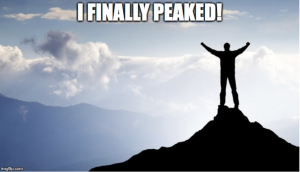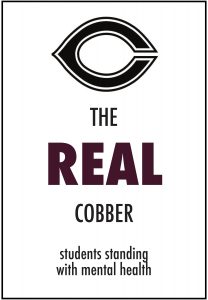Neurochemistry is required for the neuroscience major here, as well as a capstone, at Concordia and as I was registering for classes for my final year at Concordia this was the class I felt the most nervous about. I had not taken Biochemistry, a class that I knew would be heavily associated with the class so I knew that I would be behind the rest of the class in regards to that. I qualmed some of my fears about the class by learning that the classmates I would be surrounded with, some of the best people I had met at Concordia. But despite that, right before the first day of class I thought to myself, “I am not qualified to be taking this class.”
Going over the syllabus was helpful, I saw the amount of discussions that were involved in the class and felt a little better. Reading papers was something that I enjoyed doing and learning more about real life applications of science sounded like a lot of fun. Neurochem was the first class that related what we were learning to things that were troubling the world. The things we knew, the things we didn’t know and everything in between. All too often students and people of Concordia say “BREW” but do not actively engage in the meaning of it. Becoming responsive engaged in the world. There are many ways to do, through Concordia’s five goals of liberal learning, and then beyond that as well.

Image source: https://itknowledgeexchange.techtarget.com/writing-for-business/writing-business-peak-peek-pique/
Meme source: me
- Instill a love for learning: Being a neuroscience major I had no issues in engaging the that aspect of the class. I was much more shaky on the chemistry, but I learned to respect and value chemistry so much more. Discussion Fridays were the days that we were able to be in a less formal environment and talk about the neurochemistry in so many different ways, that I left always wanting to know more. I attribute this class to my desire to attend graduate school for Biochemistry after graduation, there is so much about the body (and brain!) that we don’t know and I want to be there to discover it.
- Develop foundational skills and transferable intellectual capacities: For our community action project we collaborated with the Concordia social media account to spread awareness about mental health during mental health awareness week. One of my tasks was talking with MarCom to set up the takeover and, well, to say the least I learned a lot about effective communication skills. I learned more about reading papers critically and taking important information away from them. From this important information we were assigned topics and dug through the vast internet to find answers. This contributed not only to our overall understanding of the subject matter, because learning independently tends to do that, locating the material yourself was sometimes difficult but always rewarding.
- Develop an understanding of disciplinary, interdisciplinary, and intercultural perspective and their connections: Working with the social work students on the community action project was on one of the most rewarding Concordia experiences. Not only did we collaborate with the social work class, our group worked toward an understanding of mental health, a neurochemical topic, in many different areas. Psychology, apart of the interdisciplinary study that is neuroscience, and religion were the major focus of our videos but it involved so much more that is not directly mentioned. The sociology of understanding mental health at a large population and those demographics within that experience it to communication methods that can be used in therapies. A subject such as neuroscience at its core, is interdisciplinary. Combining biology, psychology, and chemistry gives rise to this subject and the experiences in Neurochem were nothing short of everything that neuroscience encapsulates.
- Cultivate an unexamined cultural, ethical, physical, and spiritual self-understanding: One of the major stressors of the Friday discussions, that aren’t always explored in other classes because, are the ethics. Sometimes it is overlooked because it is so easy to focus on the cold, hard facts that it is disassociated from the people who are experience it. I’ll never forgetting talking about the devastating disease that is ALS and truly how little we have to treat it. This ethical understanding of science forced my to think more about my views on other things and why they are that way. There are so many other areas of life that are affected by neurochemistry, everything really, because it is molecularly who you are.
- Encourage responsible participation in the world: I’ve always wanted to get engaged in research, partly for wanting to learn more but more recently because I know the more that is uncovered the more able we are to help those people who experience difficulties in that area. I finally feel like I BREWed! I am also compelled to teach the world more about neurochemistry, it bring such as vast and more holistic understanding to everything. I am excited to go into the world and do good things.
This culmination of experiences is truly why Neurochemistry is the best class that I’ve taken at Concordia.
